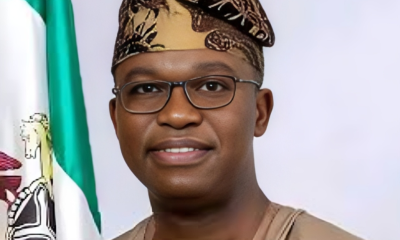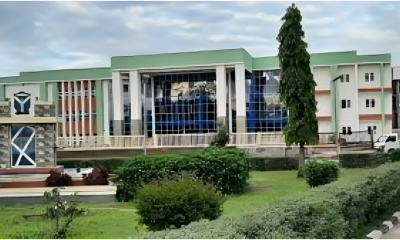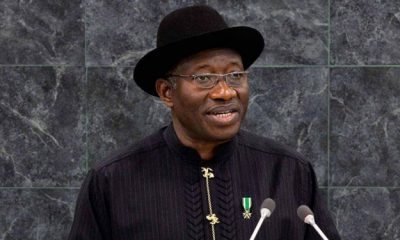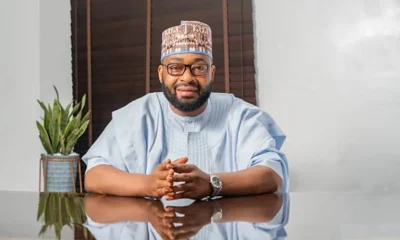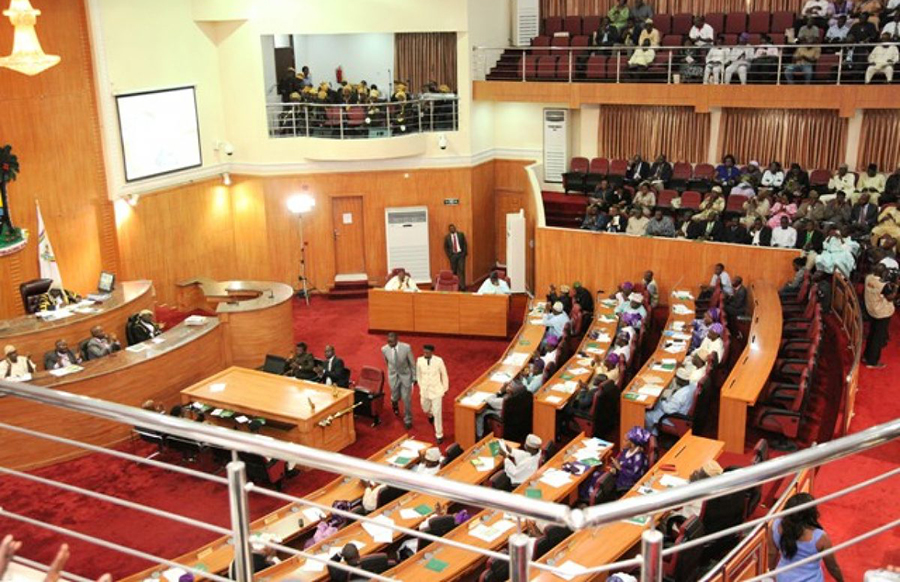COLUMNISTS
Is This How Economies and Nations Collapse?

By ‘Tope Fasua
I am afraid. Very afraid. I knew there was always a possibility that I will be left holding the can with my bet that Nigeria was the country to be and that we should stay here and make the most of our country. I always had a fear that we may one day totally screw up this nation.
It looks like that time has come. The Buhari government, through a very deadly combination of incompetence, deception, self-deception, wickedness, arrogance, insularity and ill-luck, has finally pushed us to the very brink. We used to think Nigeria was at the brink. One over-sabi American Ambassador, John Campbell, wrote a book to that effect some years ago. But both he and us, knew nothing about being on the brink.Economic Collapse
I sought to get an idea off the internet about what it means for an economy to collapse. The results threw up pointed to when economies go into depression. Apparently, it is a slow process as a country loses grip. It could span over several governments. Nigeria had always been in the throes of collapse to be honest. For the symptoms of economic depression has been with us for a long time, and I have humbly pointed to that fact – that we should stop deceiving ourselves that we went into recession when others did and came out when others did. We were permanently in a depression. The dictionary says if an economy was to collapse “you would likely lose access to credit. Banks would close. Demand would outstrip supply of food, gas, and other necessities. If the collapse affected local governments and utilities, then water and electricity might no longer be available”. Another definition of a failed and depressed economy says “a worsening unemployment rate is usually a common sign of an impending economic depression, rising inflation, declining property sales, increasing credit card debt defaults…”
Let us scan our environment. Government supporters will say that our inflation fell from almost 19 per cent back to 15 per cent, but that inflation is climbing again. The Bureau for Statistics has announced that this is partly due to the fuel scarcity that still subsists in many parts of the country. The fuel importation business is killing Nigeria and subsidy, according to the National Oil Company, could now be as high as N300. We will do a back-of-the-envelope calculation to see just how much trouble we are in, but suffice to say that for the first time, ever, since we have become an oil producing nation, we are not only unable to gain from a major disruption in the oil and gas markets, but every price increase seems to be hurting us to the bone. What happened? When did we turn the corner? Have we finally ruined this country, looted her to the bones, used impunity, myopia and utter greed to ruin our children’s future?
Inflation and Devaluation
When I looked at inflation since 2015 on some staple items, I found out prices had increased by an average of 300 per cent. This included most food items, which takes the first charge from people’s earnings. Very few Nigerians could have earned 300 per cent more than they did in 2015. Devaluation of currency was a major driver of inflation. I must tell devaluation enthusiasts – most of whom are protected folks who have enough dollars stashed everywhere (bankers, oil workers etc, including our amiable vice president), that at the end of the day what they are proposing is that life will become more hellish for the citizens to the extent that they give up on some imported goods that they used to enjoy. That is how devaluation has always worked. It results in street protests and unlucky governments are removed therefrom. What I am proposing is not to keep defending the naira, but to be wise about it and to have some mercy for the poor folks in this country. A government may have to take a risk and invest in the productivity of its citizens before devaluing. For a country like Nigeria, almost everything we touch and need – from our food, to our clothing, to our housing, to our children’s local education – has huge elements of importation and once we devalue, the prices of these daily staples simple soar, leaving millions of our people in the hole.
Incredibly, the same devaluation/currency floating enthusiasts are also the ones who quarrel when the Central Bank says it shall not support the importation of items like rice, spaghetti, chicken, eggs, Indian incense, candles, toothpicks, water, bagged cement, paracetamol, malaria drugs, cocoa butter, mosquito coils, tomato paste, soaps, toilet paper, multivitamins, aspirins, beef, fruit juice among others. I think there is a mental block somewhere. I have listed quite a few of the 43 ‘banned’ items. These are things that a people with some shame should be able to produce themselves. In fact, I will support and suggest that more items be placed on that list to save ourselves from the calamity which is bearing upon us. There must be direct impetus for local industries. We have not done enough. I don’t care that some overfed and lucky guys are so selfish they cannot see further than their noses. They want to be the only ones enjoying those imported luxuries so cheaply if the government throws the borders open. I know that restricting imports encourage smuggling but a bit of sincerity and intelligence in our borders will frustrate smugglers and make the policy work. We must start to produce ourselves. We are simply too lazy and uninspired. We just want to enjoy things with immediacy – things produced by other people. No nation is built that way. Simple. We must get very serious and immediately too. For we are drowning.
Of course, the other indicators of a collapsing nation and economy have been very much with us for decades but have only got worse under Buhari’s sleepwalking leadership. He doesn’t talk to the people. He doesn’t write. When he speaks, he gets angry that people put him under pressure. And so, the people decided to take things into their own hands. We know what has happened to unemployment, and how Nigeria became perhaps the most unsafe country in the world, with the worst ever reputation of any country on earth. We are aware that illiteracy has notched up, in a time where almost every nation on earth could never contemplate leaving children out of school. Buhari did nothing for the 15 million children who roam Nigeria without education. With that problem, Nigeria mortgaged two national lifetimes, or more.
Poverty Capital
The world poverty clock recently recalibrated, incorporating the effects of covid-19. Nigeria became second to India, with 70 million poor people as against India’s 83 million. But the graph also shows that whereas India is getting people out of poverty on a per-second basis, Nigeria is leading the group of mainly headless African countries where more people are entering extreme poverty on a per-second basis. Most of the red zones are in Africa, with Nigeria leading the pack followed by DR Congo with 67 million people in abject poverty. The 80 million in India is minute compared to their 1.3 billion population, meaning that proportionally, Nigeria and DR Congo lead the poverty pack. What a shame! China, with more than 1.4 billion people is almost clear of poverty and at the same level as all western nations, with less than 3 per cent of their population in poverty and clear and effective government policies that are working to lift people out daily. In China, even the private sector is playing a significant role in eradicating poverty; a system that Nigeria should have copied if we weren’t possessed by some evil spirit which is egging our leaders to destroy this country.
Chinese Loans
And speaking about China, one key indication of our economic failure is the stoppage of Chinese loans. The Minister of Transport raised the alarm that most of his programs will stall as a result. We may end up with white elephant, uncompleted or suboptimal projects all over the place. At the Dubai World Expo recently, I saw the buzz that is going on with Angola and Gabon, largely as a result of Chinese investments. Those countries have shown that even as black people they aren’t as reckless and shady as the utterly arrogant Nigerians, who have negative patriotism for their country and would rather loot every farthing in sight. China, as liberal as it is, is tired of Nigeria’s stupidity and has now clammed up. One of their companies even sued our minister for something or the other. The western nations who have been jealous of China’s incursion, have us back in their grips. And in that grip, nothing productive has come out in the last 40 years. It was only with the brief dalliance with China that we repositioned our airports and built some rail network. The western countries are totally cynical and have become toxic to our socioeconomic development. They will soon appear with conditionalities, including sexual ones. Already, with very little to show for it, Nigeria spends close to 90 per cent of all her earnings to service debts! We are totally cooked!
How Crude Oil Became a Liability
A back of the envelop calculation will reveal to us how much trouble we are in with the crude oil sector. If Nigeria produces 1.5 million barrels per day and our own share of production for local consumption is about 400,000 barrels, we could hope that with current spikes in crude prices as a result of the Ukrainian war, our margins could stabilize around at least $80. This is because cost of production is higher in Nigeria than most other oil producing countries in the world. What costs about $5 to produce elsewhere could cost as much as $20 to $30 here. With $80 margin, on 1.1 million barrels, this is $88 million per day, all things being equal. However, we understand, through the work of the Nigeria Extractive Industry Transparency Initiative (NEITI), that only about 30 per cent of this is due to Nigeria, the remainder (70 per cent) being for the international oil companies. So, at best, we get $26.4 million as extra, per day, or $9.6 billion if we gross out for a year. However, we are said to be enjoying a subsidy of at least N250 per litre of imported petrol. So, the subsidy expense is something like N250 multiplied by at least 60 million litres (daily consumption), which sums up to N15 billion daily, or $36 million (using N415 as official exchange rate). In a year, our subsidy expense is roughly N5.4 trillion or $13 billion. On a net basis, at the current run rate, we gain a windfall of $9.6 billion but pay subsidies of $13 billion. We are in the hole for $3.4 billion on petroleum alone.
But we could unpack the above. No one is sure of our daily petroleum consumption. Even Mr Timipre Silva recently questioned same. In May 2021, we were said to be consuming all of 93 million litres of petrol daily. Doing what exactly? What used to be standardised around 42 million litres daily has however stabilized at 60 million if we are to believe NNPC, the custodians. But the figure could be much lower. There are no saints in that industry. At every step, some people are taking huge advantage of the rest of us. The cost of producing a barrel of crude could also be worked on to be much lower. Insecurity in the oil producing areas add significant to the cost as we are told. Communities have become antsy and always demand more. International oil companies have moved deep sea where they find some peace. But we should also try and block the loopholes they enjoy. I hope the laws around deep-water production – which as per a 1993 degree gave Nigeria almost nothing in terms of royalty etc – has been repealed. Because of Nigeria’s serial breach of Joint Venture agreements, many of our production partners have now opted for Product Sharing Contracts, which on paper is meant to be sweet for Nigeria as it requires the producer to invest all the money required for production, back out his costs and share the profit with Nigeria. In short, Nigeria thinks she can just sit around and make money. In reality, PSCs have never worked for Nigeria, not in 1975 when we had the first one with Addax, not in 1993 under Abacha, and certainly not today. The IOCs have decided that we don’t deserve much and so they manage to do the calculations and give Nigeria a huge, fat nothing! Of course, sitting in plush offices and basking in airs of opulence, those controlling that industry cannot see clearly what is going on. We are finished.
To add to this, Mr Tony Elumelu, one of Nigeria’s billionaires, had cause to take on the Nigerian government on twitter over the mess in the oil sector recently. He took the government to the cleaners over incompetence and corruption and mentioned that 90 per cent of Nigeria’s crude oil is stolen. A whole 90 per cent? But we should really listen when someone like Tony speaks. He said the Minister of State, Silva, is not being honest about investments not coming into the industry too. Word on the street says that the oil license Tony recently bought turned out to be 419 as the cabal in that sector ensures he only gets 1 per cent of what is on the paper. A smart guy has been outsmarted and that could be painful.
Electricity Sector Collapse
We have the same serious issue with our electricity sector. As I type, almost the whole country suffers from rolling power failure. The national grid has collapsed for the umpteenth time in a week. The power generating companies (GenCos) have complained that they are being owed trillions of naira. The distribution companies too. The Minister of Finance assures the world that the government has removed subsidies in this area and indeed it has. I pay about N120,000 for electricity each month, despite reliance on an estate power generator. The deregulation regime is killing us. Deregulation is seen as opportunity to slit people’s throats by the Nigerian capitalist and his friends in and out of government. In the oil sector, diesel now sells for N800 because of deregulation which prices in the inefficiency and corruption and dumps everything (including fraud by the seller), on the consumers. Aviation companies are about to shut down due to the prohibitive cost of jet fuel. In every sector, and especially the petroleum and electricity sectors, we suffer the results of our laziness, lack of initiative and archaic ways of reasoning. We suffer for not having ramped up our capability to do things ourselves, rather living soft lives and expecting other people to do the work and hand over the money to us.
Petrol Scarcity and Diesel Price Hikes
For three weeks now, there has been fuel scarcity as a result of the surge in global crude prices. Importing is no longer tenable. The refineries are no longer workable even if those working there still get full salaries and promotions. It is looking like the days of permanent scarcity is back again. Abuja is one of the worst hit. Alongside petrol scarcity is diesel price hike. That segment of the market has since been deregulated. But prices has now risen from N150 in 2015 when Buhari came in, to N800 during the week, shutting down many companies. Proponents of deregulation should also consider this case study. What should we do when prices simply run away? With the deregulation of everything, are we setting ourselves up for grief? Or can deregulation also come with curbs to rein it in when it loses its way? Does deregulation have to mean that a few smart folks take advantage of poor folks?
No Unity, No Progress
And we also suffer from a refusal to cooperate. We are not only disunited along ethnic and religious lines – almost unbridgeably – but the people are opposed to the government. Businesses don’t only refuse to pay taxes, but the organized private sector through bodies like NACCIMA, LCCI, NECA and the rest have become strong opponents to any taxes or attempt by a struggling (though truly dishonest) government to reposition and get some more money to run our affairs. They have decided to oppose as a matter of policy, any attempt for the government to tinker with sources of revenue. When they recently opposed the sugar tax and went to town with strong words, I had cause to take note of this anomaly. The OPS opposes any increases in VAT, or Excise Duty, or indeed any taxes at all. Property owners vehemently oppose the payment of property taxes. People who enjoy luxuries – yacht owners, Rolls Royce owners, and those young boys who spend N10,000,000 on single nights at clubs – vehemently refuse to pay luxury tax. But if the government of the day was more honest and engaging perhaps it will wring some concessions out of these guys. Otherwise we will never get out of this canyon that we dug for ourselves.
A Doomed Currency?
The Naira is also wasted. All the attempts to protect its value has been met with frustration. Nigerians are just a people with very externalized views of the world. Many or most Nigerians believe their country is rubbish even those who are really doing well and have cause for cheer. They believe every other country is better than theirs and governments in recent years have done nothing to change this rhetoric. We would need an orator for a leader, helped by many in his team, to try and turn this situation around. The thin black market is fueled daily by the hypocrisy and sabotage from everywhere including people in government and bankers. Simple policies around travel allowances are frustrated and corruption continues to provide ready fuel for the black market. Today a margin of close to N200 exists between official and black market rates and the black market is more accessible to the common man. There is every indication, especially as Nigeria misses a critical opportunity to cash in on current crude price spike, that the naira may tumble again. It must be said that in 1973, 1990, 2006, and 2011 when crude prices spiked as a result of wars and global economic crises, Nigeria greatly benefited even if we wasted the monies. With hindsight we did better in the Gowon years when we built some infrastructures and in the Yar’Adua years when our reserved peaked at $62 billion. Today, something has broken, and higher crude prices equates more suffering for the people. Our unwillingness to do hard things and help ourselves has caught up with us.
A David’s Ark to the Rescue
In all this, we have a church pastor trying to build an ark (yes, you heard right), for $200 million or a paltry N116 billion only. While the going was good, the limit of our intelligence is to spend on self-glorification and also set aside something substantial and worthy for God – as a bribe, so that God in his infinite mercies will not consider our roles in ruining our nation and making the world a more miserable place for our fellow citizens. Perhaps the most expensive buildings here are churches and a few mosques. A lot of our cashflows went in that direction, and ironically, into things on the very direct opposite of godliness, like gambling, alcohol, philandering, and other pleasures of life. We are still what some colonialists said we are back then; given to pleasure, with no apprehension for the future. Perhaps the pastor has seen a vision, and a great flood is coming to sweep us all away. But how many Nigerians can fit into that ark? And will it accommodate all animal species to start Nigeria afresh after the floods?
‘Tope Fasua, an economist, author, blogger, entrepreneur, and recent presidential candidate of the Abundant Nigeria Renewal Party (ANRP), can be reached through topsyfash@yahoo.com.
Faith
Challenges: Baptist Convention Urges Nigerians To Move Closer To God

The Nigerian Baptist Convention says individual’s closeness to God remained the greatest factor in addressing various challenges.
President of the convention, Rev. Israel Akanji, stated this at a Sunday Service held at the Baptist International Convention Centre in Lufuwape, Lagos-Ibadan Expressway in Ogun.
The News Agency of Nigeria (NAN) reports that the Baptist’s 112th Annual Convention kicked off on Saturday to end on May 1.
NAN reports that the theme of the convention is: “Entering into Newness through Fasting and Prayer”.
Akanji who took his sermon from the book of Luke 8 vs 1 to 8 , noted that prayers remained an act of faith and called on Nigerians to focus on God who solves problems rather than the problems.
He said it was important to believe in possibilities and have the conviction that only God answers prayers.
The Baptist President cited example of a widow who was not afraid, annoyed or ashamed of her challenges but kept moving until she overcame the challenges with her closeness to God.
“We should run away from factors that will make us sin against God, we should love one another. We should not allow our adversaries to make us a failure.
“We should focus on God who solves problems. Keep making attempt on your goal, don’t give up , then believe in possibilities,” he said.
Akanji emphasised that the Baptist as a movement, was entering into newness through fasting and prayer as a vehicle to be able to experience newness in their lives and the country.
COLUMNISTS
The Emefiele Mess and Rivers State’s Comedy of Errors
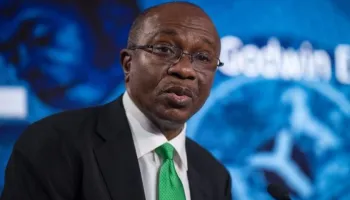
By Zainab Suleiman Okino
The former Governor of Central Bank of Nigeria, Godwin Emefiele finally got a respite last Friday when he was released from Kuje prison after meeting his bail conditions, but not before his alleged atrocious and unfathomable heists were made public, to his eternal disgrace.
Emefiele was arrested by the Tinubu-led government and spent 195 days in detention, while investigations into his tenure at the apex bank were ongoing.
Although the media decried his and the former EFCC chairman, Abdulrasheed Bawa’s long detentions without trial, in line with the country’s laws, by the time his trial commenced, it had become obvious that we had a juvenile-like man in charge of the trillion-dollar economy of Nigeria.It is therefore not a surprise that the economy also collapsed and all he could do was to encourage a figure-head President Buhari to borrow and borrow more.
Back to the shocking revelations shaking the fabric of the Nigeria society, Emefiele, according to the special investigator, Jim Obazee, operated 593 illegal US, UK, and China accounts and diverted £543,482, 213 into UK banks alone, in addition to his trial over N1.2 billion procurement frauds.
There are also allegations that Emefiele sold or “gave away” Union Bank, Keystone Bank and Polaris Bank to proxies and cronies in the guise of being special purpose vehicles (SPVs) for acquisition after CBN’s no objection report, which he had orchestrated.
Emefiele’s sins are many and the coming days will reveal the Tinubu-led government’s readiness to handle corruption-related issues concerning the ex-CBN governor, other key players in the previous administration, and anybody for that matter, and that includes those associated with him.
Emefiele, fresh out of prison, has sought for the further investigation of the shady deals he was accused of, while claiming that the accusations against him “are false, misleading and calculated to disparage my person and injure my character.” I hope so too and wish Emefiele good luck, because only a person with mental disorder would commit such malfeasances and hope not to be held accountable for them.
By far, the most damaging of Emefiele’s obnoxious policies was that of the naira redesign, which assumed a political dimension allegedly to stop Tinubu from emerging as president, but nonetheless had devastating consequences on ordinary Nigerians, leading to deaths and the crippling of people’s finances.
To think that the idea emanated from a former presidential aide and relation of President Muhammadu Buhari, is to take Emefiele’s loyalty to the Buhari cabal to a ridiculous extent. What exactly did Emefiele want? As a former MD/CEO of Zenith Bank before his appointment to the apex bank by ex-President Goodluck Jonathan, he should have felt accomplished enough not to allow his ambition, greed, and pressures from the cabal (no matter how powerful they are) to sway him towards unethical deeds, with far-reaching consequences on his reputation.
Again, Emefiele is fighting back, claiming he had presidential approval for the naira redesign, and that he neither operated 596 accounts, nor withdrew $6.23 million alongside former SGF Boss Mustapha. Whatever!
He was perceived as having his two hands in the national cookie jar, while the Nigerian people reeled in poverty. His disastrous political voyage did not help matters. Emefiele’s alleged financial sleaze and fleecing of the country was unprecedented and the most brazen in recent times.
But instead of being cautioned, he was encouraged by other officials of the Buhari government in an unholy alliance that only the ex-CBN governor is now paying for. With his experience in one of the biggest banks in the country, why he allowed non-professionals in government to drag him into the pit is incomprehensible.
Does it really mean there is no limit to the official corruption of top government functionaries or because the Nigerian public also condones it and collects peanuts to become their cheerleaders? So, the joke is on us as a people, if there are no mechanisms to stop financial recklessness in high places before they get to an outrageous level like that of Emefiele.
Running for the office of the president was Emefiele’s greatest undoing and the height of impunity. For this brazen arrogance, it was obvious that losing out would also lead to his waterloo. Was becoming president calculated to protect his loot and turf? To whose detriment? To prove his immunity from prosecution or that he was untouchable? If he had transmuted to the president of Nigeria, he would have made history, running for election as a sitting CBN governor, when he was supposed to be non-partisan.
That thoughtless action would have finally nailed Nigeria as a banana Republic, with far-reaching implications for the country’s image and its people. It would have also meant the diminished integrity of the country’s number one financial institution, which would have become a cash cow for his relentless financial laundering; another form of state capture, whereby corporate governance, leadership capability and personal morals are near zero. Surely Emefiele needs to do a lot to clear his name and extricate himself from the rot that happened under his leadership.
Rivers State Comedy of Errors
When last week President Bola Tinubu invited the warring personalities in the Rivers State political crisis – Governor Siminalayi Fubura and ex-governor and Minister of the FCT, Nyesom Wike – to the Presidential Villa for a truce, little did we know that instead of a thaw, the crisis would spiral into ridiculous confusions, drama, and intrigues.
However, as things stand today, only ex-Governor Nyesom Wike seems triumphant, but will his laughter last long? With President Tinubu behind him, the answer is in the affirmative. However, will Governor Fubura and the people of Rivers State live with the idea of being governed from Abuja? The reactions from River State stakeholders and interest groups so far reveal otherwise. They were mistaken to think the president meant well by the time the details of the ‘negotiation’ began to unravel.
The president neither reprimanded the 27 lawmakers who had defected to his party (APC), nor asked all parties to return to status quo ante, which would have ensured they remain in their party, dropped the impeachment of the governor idea and withdrew the legal cases against the lawmakers from the court.
As impossible as this may appear, it was the closest to a peace deal for all. But that did not happen. Instead, the president was silent on the defection. Some other details have since emerged indicating that it was a win-win deal for the strongman and minister, Wike, now in the inner recesses of the power loop of the Tinubu government.
If the PDP/Fubura drops the case of defection against the 27 lawmakers now in APC, how can the governor sleep with his two eyes closed when his impeachment can be organised and executed within an hour? So, where is the governor’s armor or shield against the unexpected? Again, many legal luminaries like Femi Falana and Chief Robert Clarke have condemned the unconstitutionality of Tinubu’s intervention and therefore it cannot hold water. As such, where do we go from here and what transpired?
A member of the Rivers Elders Forum and delegation to the Villa, Chief David Briggs, in an interview described the reconciliation effort as akin to a trick and the imposition of a one-sided resolution. “That was not a meeting. Mr President walked in with a written resolution, addressed us, and declared that what he had in his hand is a presidential proclamation.
He emphasised the fact that he is the president of the Federal Republic of Nigeria, and anybody who tends to say no to what he is saying, it has consequences. Tinubu in a simple layman’s word is a threat. He wrote the resolution but refused to read it. He handed the resolution to Dr Peter Odili to read it.”
I’m not sure Tinubu would have accepted this kind of resolution from President Obasanjo during his crises-ridden governorship with his two deputies at various times, yet that is the bitter pill Fubara is expected to swallow to avoid being impeached and to make Wike feel good.
That Rivers stakeholders are now speaking is a natural consequence of the comedy of error unfolding in their state. If the Fubara-Wike rift continues and political divides deepen, the crisis will linger and multiply. And if President Tinubu does not display sincere neutrality but shows more preference for Wike and defectors from PDP to APC, the intrigues will continue. Who will laugh last in the Rivers conundrum? The politics in Rivers State is more than humour. It has the capacity to consume the governor and create endless frictions, sadly to the detriment of the people. But then who can ever understand the game plan of politicians?
COLUMNISTS
African Tales in Engineering the Courts

By Chidi Odinkalu
At their summit in Nassau, The Bahamas, in 1985, the Commonwealth Heads of State and Governments (CHOGM), decided to establish an Eminent Persons Group to explore difficult dialogue with the Apartheid regime in South Africa. The EPG was to be led jointly by Australia’s former Prime Minister, Malcolm Fraser and Nigeria’s former military ruler, Olusegun Obasanjo.
Emeka Anyaoku, the Nigerian diplomat who would later serve with considerable distinction as Secretary-General of the Commonwealth, headed the secretariat of the EPG.In 1986, the Group undertook its first insertion into South Africa. In his memoirs, The Inside Story of the Modern Commonwealth, Chief Anyaoku narrates that the mission was underwritten by a bargain with the Apartheid regime that all persons whom it met with would suffer no reprisals.
However, in Cape Town, Chief Anyaoku recalls, Trevor Manuel, who was then one decade away from becoming Finance Minister in the post-liberation administration, ended up in a police cell the night after meeting with the delegation.On the night of Trevor’s arrest, his lawyer called to notify Chief Anyaoku about the fate that had befallen his client. It was approaching mid-night when Chief Anyaoku called Mr. van Heerden, the liaison between the delegation and the South African regime, to accuse them of breaching the understanding at the very heart of the mission. Mr. van Heerden promised to investigate. Less than one hour later, according to Chief Anyaoku, Mr. van Heerden called him back to confirm that Trevor Manuel was indeed detained in a police cell.
In response to Chief Anyaoku’s insistence that Trevor be promptly released, Mr. van Heerden volunteered that he would be granted bail overnight to appear “before Magistrate Court No. 13 the following morning.” According to Chief Anyaoku “Mr. van Heerden then went on to tell me that, once the case was called, it would immediately be adjourned sine die…. I thereafter told him that I would make discreet use of the information he had given me. He interjected that I should please note that his ‘government and security services do not interfere with the judicial processes.’ I said, ‘of course, I know you don’t!’ and we both laughed.”
In a testament to Mr. van Heerden’s powers as a gifted clairvoyant, the court proceedings the following morning went exactly as he had predicted. His gods had engineered the courts.
Apartheid South Africa did not enjoy a monopoly of such gifts of judicial engineering. In November 1992, longtime trade Union leader, Frederick Chiluba, unseated independence ruler, Kenneth Kaunda, to emerge as the first president of a multi-party Zambia. His party was presciently named the Movement for Multi-Party Democracy, MMD.
The year after President Chiluba’s ascent to power, the office of Chief Justice became vacant after the country’s first indigenous Chief Justice, Annel Musenga Silungwe, quit the office at the age of 57. To succeed him, Chiluba appointed Matthew Ngulube. At the time, Zambia’s judges were poorly paid, a legacy from the era of Kaunda’s one-party state. Chief Justice Ngulube quickly became a darling of the international conference circuit, traveling the world and delivering homilies on judicial independence.
As his second five year term of office came to an end, President Chiluba contrived a plan to succeed himself. Armed with a judiciary which he believed to be in his pocket, Chiluba believed he could overcome a constitutionally imposed term limit and run for a third term. Zambians declined his importunation, turfing him out in 2001 in favour of senior lawyer and Chiluba’s own former Vice-President, Levy Mwanawasa.
At the beginning of President Mwanawasa’s tenure, it emerged that Chief Justice Ngulube’s preferred habitation was in Chiluba’s pocket. Once there, he burrowed himself into the favours of the former president, festooning himself with choice goodies, which enabled him to afford an extraordinary mansion on the outskirts of capital city Lusaka, valued at the annual budget of major government departments. He also trousered a reported $168,000 to finance his tastes, including school fees for his children in order to “buy his loyalty”. Decisions in all cases against Chiluba suddenly became fully engineered. When, for instance, the opposition sued Chiluba – suspected to have descended from the Democratic Republic of the Congo (DRC) – over his nationality, the Chief Justice acted more like the president’s counsel than an impartial judge.
Zambia was not the only place where judges preached independence but failed to practice it. In Malawi, government engineered judges with generous awards of sugar distribution quotas.
In Nigeria, the revolutionary decision by the Supreme Court in January 2020 to award the governor’s office in Imo State to a man who had been well beaten to fourth position in the election conducted the previous year, was trailed a fortnight earlier by a grubby “man of god” with a nose for predicting only what the politicians pay him to.
Last year, as Zimbabwe headed towards elections conducted earlier this year, President Emerson Mnangagwa, overcome with unparalleled generosity, doled out $400,000 to each of the country’s judges claiming that it was a housing loan in a country in which a luxury home cost about 20% of that sum or less. By coincidence, Priscilla Chigumba, Chairperson of the electoral commission, which was to supervise the vote, just happened to also be a judge. The outcome was foregone.
Around Africa, the encounter with elective government has cratered assumptions about judicial integrity and independence. As a result, few are prepared these days to credit judges with virtues associated with Caesar’s wife. In many cases, judges now openly cavort with politicians and are unashamed about serving the interests of ruling parties, rather than holding them to account. The consequences can be brutal.
In April 2020, Mali’s Constitutional Court overturned the results of more than two dozen parliamentary seats won by the opposition. Its decision to hand these seats over to the ruling party sparked an uprising that led to the government’s overthrow. When the court was busy robbing the opposition of its seats,
the Economic Community of West African States (ECOWAS) and the African Union (AU), looked complicitly on. After the uprising had been consummated in a coup, they got their institutional knickers in a proverbial twist, protesting the travails of non-existent democracy.
Judges who refuse to be so readily engineered can suffer intimidation. In Malawi, former president Peter Mutharika launched an unprecedented attack on the judiciary after the Supreme Court upheld a Constitutional Court decision annulling his re-election and ordering re-run after finding the election to have been massively rigged. In what appeared to be an act of political reprisal, the president, himself a former law professor of considerable experience, moved to oust the Chief Justice, Andrew Nyirenda and another senior justice, Edward Twea, by ordering them to take compulsory leave ending in retirement. Tens of thousands of Malawians, led by hundreds of lawyers, protested in support of the judges. On 14 June 2020, the High Court suspended the presidential order, staying the ouster of Nyirenda and Twea. The people of Malawi did the rest, seeing off the forgettable tenure of Peter Mutharika in the re-run that ensued.
Some judges may even pay with their lives. Such was the tragic fate of Congolese judge Raphael Yanyi, who presided over the unprecedented trial for corruption trial of Vital Kamerhe, the Chief of staff to the president. On May 26, 2020, Judge Yanyi, who was supposed to be under close protection from a team of six specially-trained police officers, died suddenly. The police initially claimed that the judge died of a heart attack “but an autopsy report revealed that he died from knife-like injuries to the head” or what the Justice Minister described as “the blows of sharp points or knife-like objects, which were thrust into his head.” Far from dying of natural causes, it was clear that Judge Yanyi had been murdered.
Wise judges work hard to avoid this fate with benefits. In the past, judicial greatness was calibrated in the currency of jurisprudence. Today, many of Nigeria’s senior judges prefer to measure their success in terms of propinquity to power and impunity with planting their children and intimates on the bench. That is the local currency of judicial engineering.


